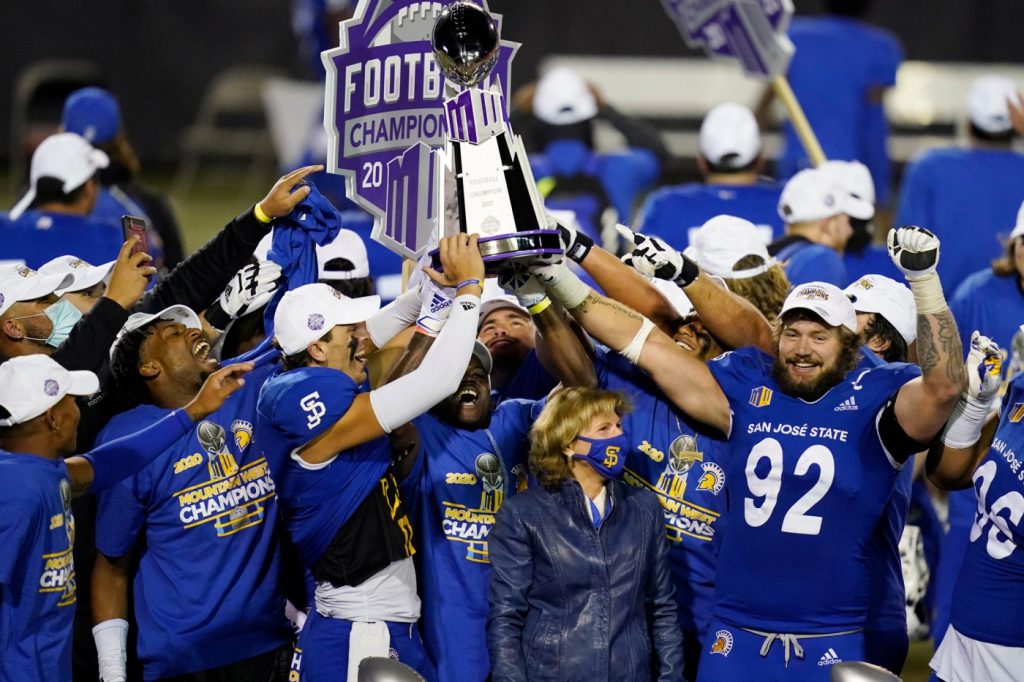SCOTTSDALE — Not a day goes by without someone somewhere in the college football universe offering an opinion on the future of the Group of Five.
Should the schools create their own top-25 poll?
Should they form a separate, (very) unequal postseason event?
How can the Group of Five, which includes the Mountain West and American conferences, possibly compete with teams in the power leagues given the immense disparity in revenue?
But in one sense, the Group of Five is vastly better positioned than ever before: It has a guaranteed path into the College Football Playoff.
The expanded 12-team event that begins this fall provides automatic bids to the five highest-ranked conference champions. Because there are only four power leagues (ACC, Big 12, Big Ten and SEC), the fifth spot is reserved for the best team in the Group of Five, as determined by the playoff selection committee.
“The piece that was most important to us was access,” Mountain West commissioner Gloria Nevarez told the Hotline last week.
“The five top conference champions are in the playoff. That is something we are aiming for, that we work for, that we talk about and that we hope to position for.”
The Group of Five did not have guaranteed access under the four-team playoff format in place from 2014-23. Of the 40 semifinal berths awarded in a decade under that model, only one went to a school outside the Power Five: In 2021, Cincinnati made the CFP as the undefeated champion of the American.
The Bearcats have since moved on. They joined the Big 12 last year, along with fellow American members UCF and Houston. And the conference is losing another top football program, SMU, to the ACC this summer.
Which means the Group of Five landscape is wide open.
Can the Mountain West capitalize?
The conference has remained intact through the latest realignment wave and features Boise State, Fresno State and San Diego State, three time-tested Group of Five programs.
“We are building a competitive strategy around that spot, but I won’t comment on specifics,” Nevarez said. “That’s the secret sauce. We spend a lot of time talking about that.”
Nevarez addressed a number of other topics last week during a conversation at the Fiesta Summit, the annual gathering of college sports officials.
— On the next edition of the CFP, which starts in 2026
“So much of it is TBD. The pillars that were decided (earlier this year) were revenue distribution, high-level governance and the access piece. And that access piece was … No. 1 for a reason. So we continue to aim toward that.”
— On the state of the Mountain West
“I feel like we’re on a really good trajectory with everything that’s happened in the environment.
“Even before the transfer portal, we were that league that if we find good diamonds in the rough or cultivate great talent, it’s gone. That’s presidents, athletic directors, coaches, etc. We develop talent through higher education. We are living the mission. And we always reload.
“Half of our football coaches are new this year, but it’s incredible talent. You look around the room, and it’s like, Yeah, OK! Our AD room is so talented.
“And when you have this environment, where you have a lot of people who thrive in a tumultuous environment, you get a lot of people who are comfortable with innovation, they’re comfortable with change. They aren’t super high-risk takers, but they are a little more risk-tolerant than I’ve seen in other conferences. At the same time that it’s super fun, it’s super scary, too. But I feel like this league is built to withstand this.”
— On NCAA Tournament expansion
“This is a wonderful property. Whatever is done must not diminish what we have now or jeopardize it in any way. It’s amazing. But I can see potentially squeezing a couple more first-round games in.
“I was on the original (NCAA) transformation committee that talked about championships, and the whole 20 percent number that got shifted right onto the spotlight of men’s and women’s basketball was really intended as a global mark for all the championships. Because you have some — baseball was the example at the time — where a team that barely gets (into the tournament) runs the field.
“It’s a valid example. If your goal is to have the best teams in the country compete for the national title, your field should be big enough. Operating premise No. 1 is: Every league should have an AQ spot (automatic qualifier). So operating principle No. 2 should be: How big should the field size be, based on the number of teams in the universe based on the number of AQs?
“Both of those change in all the other sports to encompass the right amount of teams, so you have the best competing for the national title. So 20 percent seemed to be the number to at least embark on the exploration, which immediately became, ‘Basketball’s going to expand!’
Related Articles
Transfer portal breakdown: Arizona defends its turf, Oregon gobbles talent, UW needs linemen, Colorado loses skill and more
Big Ten football: The tiebreaker conundrum isn’t just about the conference championship matchup
Mailbag: Utah’s post-Whittingham plan, Big Ten kickoffs, USC’s valuation, Colorado’s outlook, BYU’s win total and more
Cal, Stanford football programs at crossroads: Our to-do list for the new campus leaders
Pac-12 recruiting: Ranking top prospects for 2027 NFL Draft
“I trust (NCAA senior vice president for basketball) Dan Gavitt implicitly as the guardian of the game, so I don’t think they’re going to go crazy with it.”
— On a potential partnership with the American as the gatekeepers to the Group of Five
“ I just met (new AAC commissioner) Tim Pernetti. Our leagues have a lot in common; we have a lot of likeness. But I don’t think we got there yet.
“We encompass what the college model is. If the environment changes, we still are going to be sponsoring college sports, and we’re still going to have a championship and a playoff.
“The economics are going to change drastically, but the economics just changed. Survive and advance seems to be something our schools have gotten accustomed to.”
— On the football scheduling arrangement with Washington State and Oregon State
“From our perspective, everything is set. But think of it as a lot of non-conference games on our schedule. They are still operating their own officiating; they still have their own conference operations.”
*** Send suggestions, comments and tips (confidentiality guaranteed) to [email protected] or call 408-920-5716
*** Follow me on Twitter/X: @WilnerHotline
*** Pac-12 Hotline is not endorsed or sponsored by the Pac-12 Conference, and the views expressed herein do not necessarily reflect the views of the Conference.


